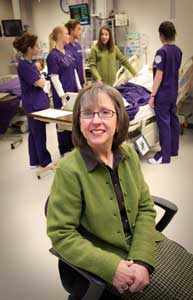Attacking ignorance
 |
Fort Worth, TX
5/10/2010
By: Nancy Allison
If you´re female and over 40, you should know a lot about the symptoms of ovarian cancer. Unfortunately, as Suzy Lockwood, director of TCU´s Oncology Education and Research Center, has discovered, you probably don´t.
In a study published in The American Journal of Nursing, Lockwood and her team revealed just how little women know about the warning signs of this deadly disease.
And yet, the consequences of ignorance are deadly: most ovarian cancer cases are not diagnosed until stage III or IV. The five-year survival rate for stage III ovarian cancer is 70 percent; at stage IV it falls to 31 percent.
If women knew what to look for, says Lockwood, more cases would be diagnosed in the early stages, and there the news is good: a five-year survival rate of 93 percent. But only 19 percent of cases are caught early.
The trouble is, detecting ovarian cancer is difficult. Symptoms include bloating, nausea, frequent urination, constipation or diarrhea, back pain and fatigue. “Diagnosis is complicated by the fact that signs of ovarian cancer are often mistaken for other ailments,” says Lockwood, “such as irritable bowel syndrome, indigestion, and the reactions to chronic stress.”
Despite gains in surgery and chemotherapy, there is no reliable early screening test for ovarian cancer. Once referred to as the cancer that whispers, Lockwood explains that such a description is a misnomer the National Ovarian Cancer Coalition (NOCC) no longer likes to use. Ovarian cancer does present symptoms — often very loudly — but they are often misconstrued.
Late-stage diagnosis ensures ovarian cancer´s place as the number one gynecologic killer in the U.S. "So many women rationalize and make excuses for the signs," says Lockwood. "We´re tired, not eating right, we´ve hit menopause. We can think of lots of reasons why we feel bloated or our waist has grown bigger."
"I continue to see women in primary care and OB-GYN offices who comment that they had been noticing bloating for the last six months, that belts or pants felt tighter, but they thought they were just putting on weight. Or women whose symptoms have gone on for months as they´ve been repeatedly to their primary care physician and were told they were having gastrointestinal problems. Tragically, many specialists continue to treat women for diverticulitis or reflux before first ruling out ovarian cancer."
In 2009, 21,500 new cases of ovarian cancer were diagnosed, and 14,600 women lost their lives to the disease. Last summer, a five-year, $11.5 million grant by the National Cancer Institute to develop better treatments for ovarian cancer was awarded to the Mayo Clinic Cancer Center. This was just about the time that Lockwood was writing up the results of the NOCC survey.
While Lockwood applauds the NCI grant, she believes that if more funds were devoted to educating women about symptoms, less money would be necessary to allocate toward late-stage treatment.
Educating women about the signs and symptoms of cancer is Lockwood’s life mission. A 1983 TCU nursing graduate, she became a nurse oncologist in 1985, working with the first gynecologic oncologist in Fort Worth for 10 years. She has been a board member of the NOCC for eight years, and offers three cancer presentations annually to TCU employees.
Two years ago, she launched the TCU Smart Women Conference, an annual event that includes talks by leading experts on the cancers that affect women the most. In 2009, in addition to teaching and directing the Oncology Education and Research Center, she edited Contemporary Issues in Women´s Cancers, a book that presents cutting edge research on the incidence, assessment and treatment of cancers, particularly gynecological cancers, affecting women.
Still, there´s a lot more educating to be done, as Lockwood has found. Data from the convenience sample of 1,235 women who responded to NOCC´s online survey revealed that 85 percent were unfamiliar with the symptoms of ovarian cancer.
Only 19 percent had ever spoken with a primary care physician about ovarian cancer — of that number, two-thirds had begun the discussion themselves. Four out of five women had never had such a discussion, and more than half of those believed that if it were an important issue for them, the doctor would have initiated it.
In addition to limited knowledge of symptoms, the survey also revealed a dangerous level of wrong thinking in the responses. Two-thirds of the women surveyed believed that a Pap smear tests for ovarian cancer.
"This is absolutely untrue," says Lockwood. The Pap tests for markers of cervical cancer only.
"As a nurse, it is very frustrating to me that women think the Pap is testing for ovarian cancer. I have even met women who have ovarian cancer, who believe that it was the Pap test that caught the disease. The truth is that as part of the gynecological exam, the doctor palpates the ovaries to check for enlargement or unusual lumps or bumps. If ovarian cancer is detected during a gynecological visit, it will be through the physical examination, NOT the Pap."
Lockwood´s survey validates the need for education and programming for increasing women´s awareness about ovarian cancer. True, those who had a family member or friend with the disease fared better than those who hadn’t when it came to symptom awareness.
But women need to be their own advocates, says Lockwood. “With no early detection screening for ovarian cancer, women must rely on their own knowledge of risk factors and symptoms. Be familiar with the warning signs, especially if there is history of breast and/or reproductive cancers in your family.”
Above all, says Lockwood: “Listen to your body, and if symptoms continue for two weeks or more, make an appointment to see your health provider. Please."
Contact Lockwood at s.lockwood@tcu.edu.










